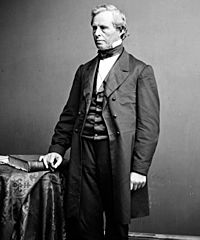William G. Brown Sr. facts for kids
Quick facts for kids
William G. Brown Sr.
|
|
|---|---|
 |
|
| Member of the U.S. House of Representatives from Virginia's 15th district |
|
| In office March 4, 1845 – March 3, 1849 |
|
| Preceded by | Lewis Steenrod |
| Succeeded by | Alexander Newman |
| Member of the U.S. House of Representatives from Virginia's 10th district |
|
| In office March 4, 1861 – March 3, 1863 |
|
| Preceded by | Sherrard Clemens |
| Succeeded by | vacant |
| Member of the U.S. House of Representatives from West Virginia's 2nd district |
|
| In office December 7, 1863 – March 3, 1865 |
|
| Preceded by | n/a |
| Succeeded by | George R. Latham |
| Member of the Virginia House of Delegates from the Preston district |
|
| In office December 3, 1832 – December 1, 1833 |
|
| Preceded by | William B. Zinn |
| Succeeded by | William Carroll |
| Member of the Virginia House of Delegates from the Preston district |
|
| In office December 1, 1840 – February 14, 1844 |
|
| Preceded by | William Carroll |
| Succeeded by | Isaac Baldwin |
| Personal details | |
| Born | September 25, 1800 Kingwood, Virginia (now West Virginia), US |
| Died | April 19, 1884 (aged 83) Kingwood, Preston County, West Virginia, US |
| Political party | Democrat Unionist |
| Spouses | Juliet Ann Roberts Byrne Margaret P.Gay |
| Children | William Gay Brown Jr. |
| Profession | lawyer, politician, banker |
William Gay Brown Sr. (born September 25, 1800, died April 19, 1884) was an important politician and lawyer in the 1800s. He was elected to the Virginia General Assembly twice. He also served three times in the U.S. House of Representatives.
Brown was part of the Virginia Constitutional Convention of 1850. He also spoke against states leaving the Union at the Virginia Secession Convention of 1861. During the American Civil War, he strongly supported keeping the country together. He helped create the state of West Virginia.
Early Life and Family
William Gay Brown Sr. was born in Kingwood, Virginia. This area is now part of West Virginia. He was born on September 25, 1800. His father, James Brown, was from Scotland.
William received a private education when he was young. He then studied law to become a lawyer.
In 1828, he married Juliet Ann Roberts Byrne. Her father, Major Charles Patrick Byrne, was a county clerk. After Juliet passed away, William married Margaret P. Gay in 1855. Their son, William Gay Brown Jr., also became a U.S. Congressman.
Political Career
William Brown became a lawyer in 1823. He practiced law in Kingwood. This town was the main city in Preston County.
- Serving in Virginia
Brown was elected as the county prosecutor. In 1832, voters chose him for the Virginia House of Delegates. This was a part-time job. He lost his next election but won again in 1839. He served in the House of Delegates from 1840 to 1843.
- Joining the U.S. House
In 1844, Brown was elected to the United States House of Representatives. He represented Virginia's 15th congressional district. He was a member of the Democratic Party. Brown served in Congress from 1845 to 1849.
- Virginia Conventions
In 1850, Preston County voters sent Brown to the Virginia Constitutional Convention of 1850. He also attended the Democratic National Convention in 1860. He supported Stephen A. Douglas for president.
- Opposing Secession
Preston County voters also elected Brown to the Virginia Secession Convention of 1861. At this meeting, he spoke and voted against Virginia leaving the United States. He and another delegate, James Clark McGrew, were in the minority. They protested the decision to secede.
Because of their actions, Preston County sent representatives to the Wheeling Convention. This group wanted to stay part of the Union. Pro-secession delegates later tried to remove Brown and McGrew from their positions.
- Representing West Virginia
In 1861, voters elected Brown to the U.S. House again. This time, he was a Unionist. He served from 1861 to 1863. When West Virginia became a new state, Brown was re-elected. He represented West Virginia's 2nd congressional district. He served in Congress from December 7, 1863, to March 3, 1865.
Brown did not seek re-election after the Civil War ended. He returned to his law practice in Kingwood. George R. Latham took his place in Congress.
Later Life and Legacy
By 1870, Brown lived in Rowlesburg, West Virginia. This town was important for its lumber industry. It also had a Baltimore and Ohio Railroad station. Brown continued his law practice in Kingwood. He also served as the president of a bank for some time.
William Gay Brown Sr. passed away in Kingwood, West Virginia, on April 19, 1884. He was buried in Maplewood Cemetery there. His son, William Gay Brown Jr., followed in his footsteps. He also represented West Virginia's 2nd congressional district for three terms.
See also
- United States congressional delegations from West Virginia
 | DeHart Hubbard |
 | Wilma Rudolph |
 | Jesse Owens |
 | Jackie Joyner-Kersee |
 | Major Taylor |

